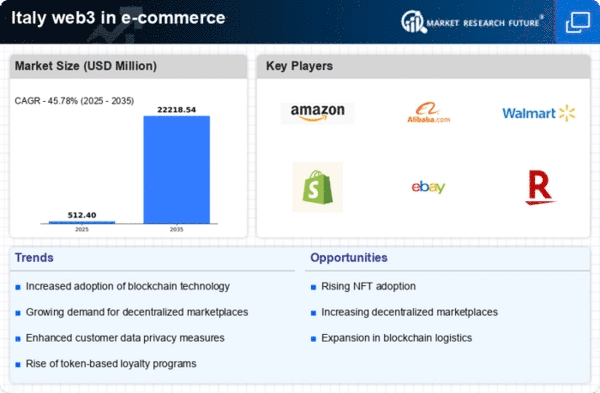Tokenization of Assets
Tokenization is emerging as a transformative driver in the web3 in-e-commerce-retail market. By converting physical assets into digital tokens, retailers can offer fractional ownership, making high-value items more accessible to a broader audience. In Italy, the tokenization of luxury goods has gained traction, with reports indicating that 30% of luxury retailers are exploring this model. This approach not only democratizes access to premium products but also enhances liquidity in the market. Consumers can trade or sell their tokens, creating a dynamic marketplace for luxury items. As the concept of tokenization becomes more mainstream, it is likely to reshape consumer behavior and expectations within the web3 in-e-commerce-retail market.
Enhanced Consumer Privacy
The web3 in-e-commerce-retail market is increasingly driven by the demand for enhanced consumer privacy. As consumers become more aware of data breaches and privacy concerns, they seek platforms that prioritize their personal information. In Italy, a survey indicates that approximately 70% of consumers express a preference for shopping on platforms that utilize decentralized technologies, which offer greater control over personal data. This shift towards privacy-centric solutions is likely to encourage retailers to adopt web3 technologies, thereby fostering a more secure shopping environment. Furthermore, the implementation of blockchain technology allows for transparent transactions, which can enhance consumer trust. As privacy regulations tighten, the web3 in-e-commerce-retail market may see accelerated growth as businesses adapt to meet these evolving consumer expectations.
Rise of Decentralized Marketplaces
The emergence of decentralized marketplaces is a pivotal driver in the web3 in-e-commerce-retail market. These platforms enable peer-to-peer transactions without intermediaries, which can reduce costs and increase efficiency. In Italy, the number of decentralized marketplace users has reportedly increased by 50% over the past year, reflecting a growing acceptance of this model. Such marketplaces often leverage smart contracts to facilitate transactions, ensuring that agreements are executed automatically and securely. This innovation not only enhances the shopping experience but also empowers small businesses and individual sellers by providing them with direct access to consumers. As more Italian retailers recognize the benefits of decentralized marketplaces, the web3 in-e-commerce-retail market is poised for substantial growth.
Integration of AI and Machine Learning
The integration of AI and machine learning technologies is significantly influencing the web3 in-e-commerce-retail market. These technologies enable retailers to analyze consumer behavior and preferences more effectively, leading to personalized shopping experiences. In Italy, approximately 60% of e-commerce businesses are investing in AI-driven solutions to enhance customer engagement. By leveraging data analytics, retailers can tailor their offerings, optimize inventory management, and improve customer service. This trend not only boosts sales but also fosters customer loyalty, as consumers are more likely to return to platforms that understand their needs. As AI continues to evolve, its role in the web3 in-e-commerce-retail market is expected to expand, driving further innovation.
Sustainability and Ethical Consumption
Sustainability is becoming a crucial driver in the web3 in-e-commerce-retail market, as consumers increasingly prioritize ethical consumption. In Italy, a significant portion of the population, around 65%, is willing to pay a premium for products that are sustainably sourced and produced. This shift in consumer values is prompting retailers to adopt web3 technologies that promote transparency in supply chains. Blockchain can provide verifiable information about the origins of products, allowing consumers to make informed choices. As sustainability becomes a core value for consumers, the web3 in-e-commerce-retail market is likely to see a rise in demand for eco-friendly products and practices, compelling retailers to adapt accordingly.
















